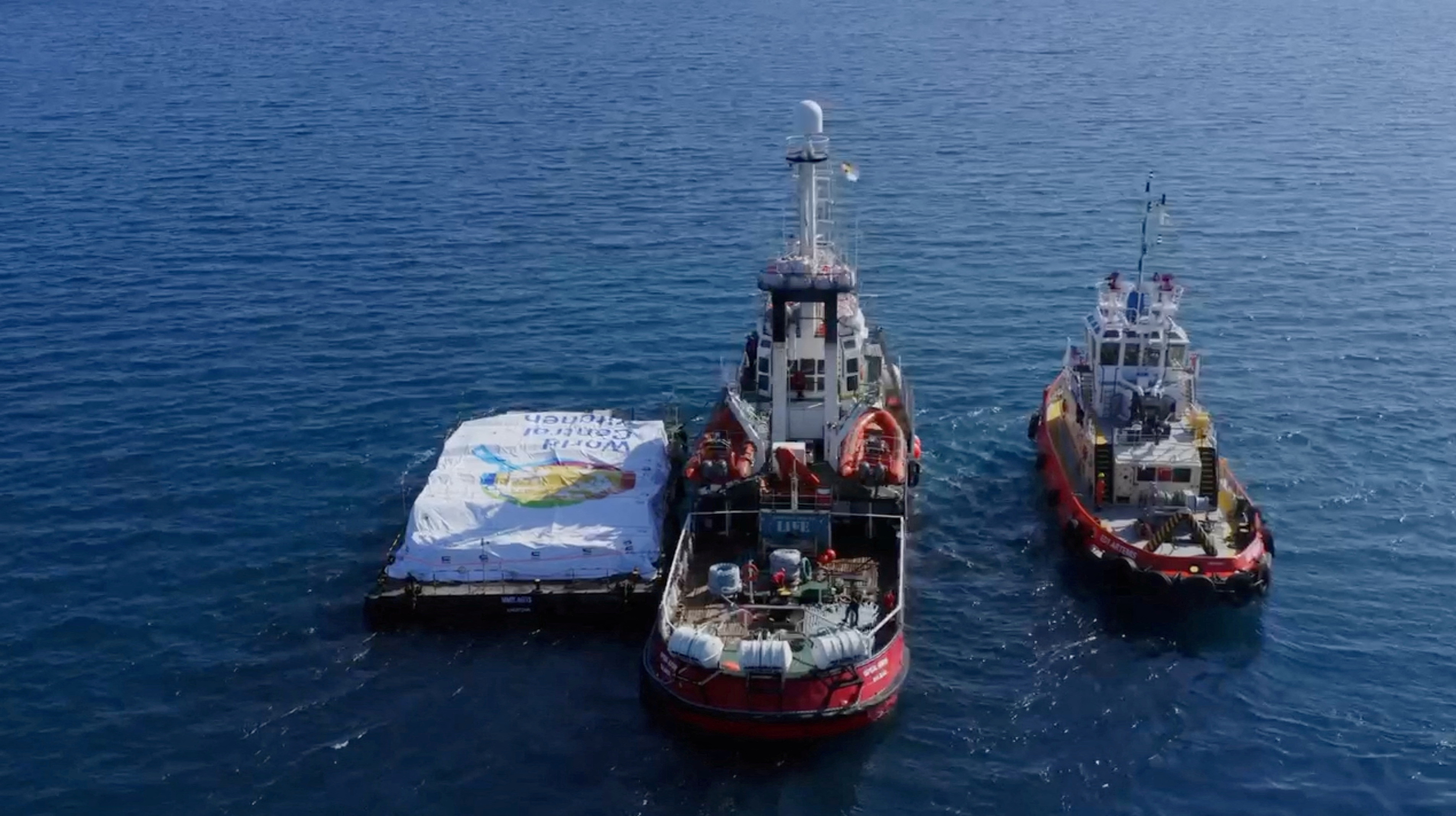A ship carrying 200 tonnes of aid for Gaza left Cyprus on Tuesday in a pilot project to open a sea route to deliver supplies to a population aid agencies say is on the brink of famine.
The charity ship Open Arms was seen sailing out of Larnaca port in Cyprus, towing a barge containing flour, rice and protein. The mission was funded mostly by the UAE and organised by U.S.-based charity World Central Kitchen (WCK).
The journey to Gaza takes about 15 hours but a heavy tow barge could make the trip considerably longer, possibly up to two days. Cyprus is just over 200 miles (320 km) north-west of Gaza.
The U.S. military said its vessel, the General Frank S. Besson, was also en route to provide humanitarian relief to Gaza by sea.
With aid agencies saying deliveries into Gaza have been held up by bureaucratic obstacles and insecurity since the start of the war on Oct. 7, and even Israel’s allies demanding easier aid access to the enclave, attention has shifted towards alternative routes including sea and air drops.
Tuesday’s mission was the culmination of months of preparation by Cyprus, the EU member state closest to the conflict. It is keeping a wary eye on spillover effects from upheaval in the Middle East and is already seeing migratory inflows from Lebanon increasing. More than 400 people arrived in fishing boats on Monday.
With the lack of port infrastructure, WCK said it was building a landing jetty in Gaza with material from destroyed buildings and rubble. This is a separate initiative to a plan announced by U.S. President Joe Biden last week to build a temporary pier in Gaza to facilitate aid deliveries by sea.
Advertisement · Scroll to continue
Prior to the outbreak of the war on Oct. 7, about 500 trucks entered Gaza a day, with 100 of those carrying aid and the rest commercial supplies, such as fuel and cooking gas, according to UNRWA, the main UN aid agency in Gaza.
“This is when shops and markets were functioning. Currently, the whole of the Gaza population is almost entirely relying on humanitarian aid,” Juliette Touma, UNRWA director of communications, told Reuters.
“No aid ships by sea were coming to Gaza. Trucks were coming via Karem Abu Salem by road,” she added.
‘DIRE’ CONDITIONS
The U.N. estimates a quarter of the population in the pulverised enclave is at risk of starvation, and aid is barely scratching the surface of daily needs. The U.N. has previously accused Israel of blocking aid to Gaza. Israel denies imposing any limits on aid and has blamed holdups in aid on poor logistics by the U.N. and other aid agencies.
“The conditions on the ground and among the displaced are very dire, I have been touring the market since the morning and the prices are beyond the average people’s ability to afford,” said Yamen, a father of four, whose family took shelter in Deir Al-Balah in the central Gaza Strip.
“We are being starved in two ways: food is scarce, and the little that is available is so expensive as to be beyond imagination.”
The conflict has displaced most of Gaza’s 2.3 million people, with many cramped into makeshift tents with little in the way of food or basic medical supplies in the southern city of Rafah.
There have been chaotic scenes and deadly incidents at aid distributions as desperately hungry people scramble for food.
On Tuesday, Palestinian health officials reported that nine Palestinians were killed and dozens wounded in Israeli gunfire when crowds were awaiting aid trucks at the Kuwait Square in Gaza City. There was no immediate comment from Israel on the incident.
In once incident last month, more than 100 Palestinians were killed while queuing for aid. Gaza health authorities blamed Israeli fire for the deaths; Israel denied blame and said victims had been trampled.
“Bombing gatherings of hungry people has become a daily routine practiced by the occupation and seen by the international community on screens,” Ashraf Al-Qidra, spokesperson for the Gaza health ministry said on Tuesday.
“Hunger will claim the lives of all residents in northern Gaza. Aid is very scarce. The price of a meal could mean certain death. Help the people of the north. Don’t leave them prey to hunger, bombing, and disease.”
Fighters from Hamas, which administers Gaza, killed 1,200 people in an Oct. 7 attack on Israel and took 253 hostages, according to Israeli tallies, an assault that sparked the bloodiest war in the decades-long Israeli-Palestinian conflict.
Israel’s retaliatory military campaign has killed more than 31,000 Palestinians, according to Gaza authorities, while infrastructure has been obliterated.
Negotiations on a ceasefire remain deadlocked in Cairo. Israel says any ceasefire must be temporary and that its goal remains the destruction of Hamas. Hamas says it will release hostages only as part of a deal that ends the war.
Reuters





